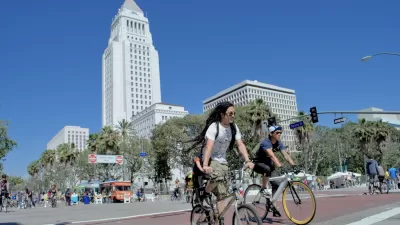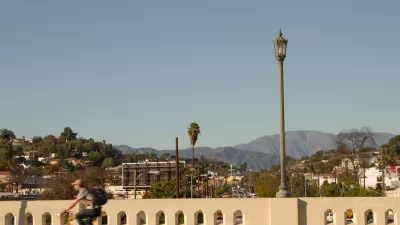The Los Angeles Times critiques the political culture in Los Angeles. In this case, it's the failure of a road diet project that provoked the criticism, but these lessons apply to the city's bicycle plans and homeless housing plans, too.

The Los Angeles Times editorial board has responded to a recent round of controversy in Los Angeles over a road diet implemented by the city in the name of traffic safety and then rescinded after complaints from commuters.
"The callousness of some of the commuters complaining about Los Angeles’ attempts to make the streets safer has bordered on satire," begins the editorial in response to the victorious voices in the latest controversy, over a road diet that reduced vehicle lanes on Vista del Mar in the Westside neighborhood of Playa del Rey. "But this is no joke — there is a real possibility that traffic concerns and knee-jerk opposition to change will override good public policy and slow, or even reverse, L.A.’s ambitious plan to dramatically reduce deadly crashes on local streets."
The editorial is at its most pointed when it calls out the leadership of the city for not doing the hard work of implementing the necessary changes to pursue the city's stated Vision Zero and Great Streets initiatives. The editorial calls out Councilmember Gil Cedillo, who recently "introduced a motion that would block any road diet or lane reconfiguration in his district," and Councilmember Paul Krekorian, who recently "sent a Great Streets project in North Hollywood back to the drawing board because he was concerned about removing traffic lanes to make room for protected bike routes."
The editorial also calls out Mayor Eric Garcetti for not continuously making the case for traffic safety—even it means removing vehicle lanes and reducing traffic speeds. That kind of leadership is necessary for any of the city's ambitious plans:
It’s easy for Garcetti and council members to tout their progressive credentials and sign off on ambitious policies to transform L.A. It’s much harder to implement those plans. Too often city leaders fold in the face of opposition. We’ve seen this with the city’s Bicycle Plan. We’ve seen it with homeless housing. And that’s why so many ambitious plans remain unfulfilled.

Planetizen Federal Action Tracker
A weekly monitor of how Trump’s orders and actions are impacting planners and planning in America.

Congressman Proposes Bill to Rename DC Metro “Trump Train”
The Make Autorail Great Again Act would withhold federal funding to the system until the Washington Metropolitan Area Transit Authority (WMATA), rebrands as the Washington Metropolitan Authority for Greater Access (WMAGA).

The Simple Legislative Tool Transforming Vacant Downtowns
In California, Michigan and Georgia, an easy win is bringing dollars — and delight — back to city centers.

The States Losing Rural Delivery Rooms at an Alarming Pace
In some states, as few as 9% of rural hospitals still deliver babies. As a result, rising pre-term births, no adequate pre-term care and harrowing close calls are a growing reality.

The Small South Asian Republic Going all in on EVs
Thanks to one simple policy change less than five years ago, 65% of new cars in this Himalayan country are now electric.

DC Backpedals on Bike Lane Protection, Swaps Barriers for Paint
Citing aesthetic concerns, the city is removing the concrete barriers and flexposts that once separated Arizona Avenue cyclists from motor vehicles.
Urban Design for Planners 1: Software Tools
This six-course series explores essential urban design concepts using open source software and equips planners with the tools they need to participate fully in the urban design process.
Planning for Universal Design
Learn the tools for implementing Universal Design in planning regulations.
Smith Gee Studio
City of Charlotte
City of Camden Redevelopment Agency
City of Astoria
Transportation Research & Education Center (TREC) at Portland State University
US High Speed Rail Association
City of Camden Redevelopment Agency
Municipality of Princeton (NJ)



























